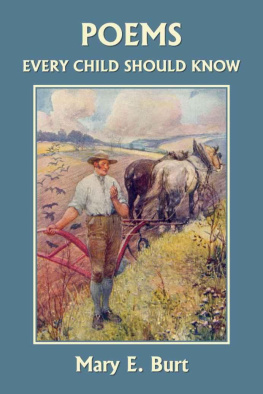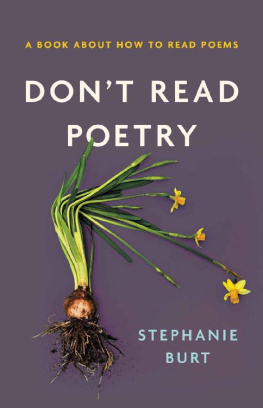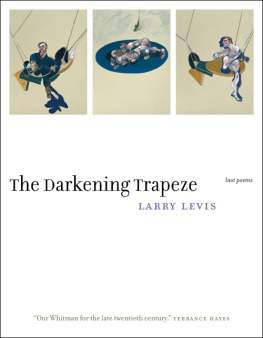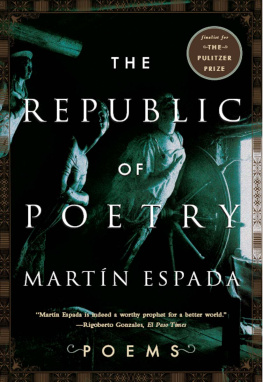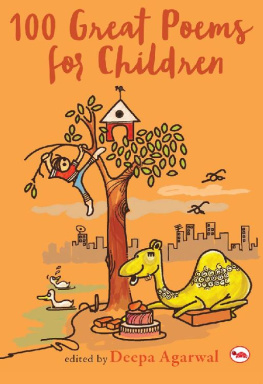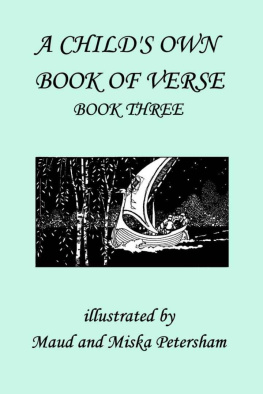Poems Every Child Should Know
by
Mary E. Burt
Yesterday's Classics
Chapel Hill, North Carolina
Cover and Arrangement 2010 Yesterday's Classics, LLC
All rights reserved. No part of this book may be reproduced or retransmitted in any form or by any means without the written permission of the publisher. This edition, first published in 2010 by Yesterday's Classics, an imprint of Yesterday's Classics, LLC, is an unabridged republication of the work originally published by Doubleday, Page and Company in 1907. This title is available in a print edition (ISBN 978-1-59915-210-3).
Yesterday's Classics, LLC
PO Box 3418
Chapel Hill, NC 27515
Yesterday's Classics
Yesterday's Classics republishes classic books for children from the golden age of children's literature, the era from 1880 to 1920. Many of our titles are offered in high-quality paperback editions, with text cast in modern easy-to-read type for today's readers.
The illustrations from the original volumes are included except in those few cases where the quality of the original images is too low to make their reproduction feasible. Unless specified otherwise, color illustrations in the original volumes are rendered in black and white in our print editions.
Preface
Is this another collection of stupid poems that children cannot use? Will they look hopelessly through this volume for poems that suit them? Will they say despairingly, "This is too long," and "That is too hard," and "I don't like that because it is not interesting"? Are there three or four pleasing poems and are all the rest put in to fill up the book? Nay, verily! The poems in this collection are those that children love. With the exception of seven, they are short enough for children to commit to memory without wearying themselves or losing interest in the poem. If one boy learns "The Overland Mail," or "The Recruit," or " Wynken, Blynken, and Nod," or "The Song in Camp," or "Old Ironsides," or " I Have a Little Shadow," or "The Tournament," or "The Duel," nine boys out of ten will be eager to follow him. I know, because I have tried it a dozen times.
Every boy loves "Paul Revere's Ride" (alas! I have not been able to include it), and is ambitious to learn it, but only boys having a quick memory will persevere to the end. Shall the slower boy be deprived of the pleasure of reading the whole poem and getting its inspiring sentiment and learning as many stanzas as his mind will take? No, indeed. Half of such a poem is better than none. Let the slow boy learn and recite as many stanzas as he can and the boy of quick memory follow him up with the rest. It does not help the slow boy's memory to keep it down entirely or deprive it of its smaller activity because he cannot learn the whole. Some people will invariably give the slow child a very short poem.
It is often better to divide a long poem among the children, letting each child learn a part. The sustained interest of a long poem is worth while. "The Merman," "The Battle of Ivry," "Horatius at the Bridge," "Krinken," "The Skeleton in Armour," "The Raven" and "Herv Riel" may all profit ably be learned that way. Nevertheless, the child enjoys most the poem that is just long enough, and there is much to be said in favour of the selection that is adapted, in length, to the average mind; for the child hesitates in the presence of quantity rather than in the presence of subtle thought. I make claim for this collection that it is made up of poems that the majority of children will learn of their own free will. There are people who believe that in the matter of learning poetry there is no "ought," but this is a false belief.
There is a duty, even there; for every American citizen ought to know the great national songs that keep alive the spirit of patriotism. Children should build for their future-and get, while they are children, what only the fresh imagination of the child can assimilate. They should store up an untold wealth of heroic sentiment; they should acquire the habit of carrying a literary quality in their conversation; they should carry a heart full of the fresh and delightful associations and memories connected with poetry hours to brighten mature years. They should develop their memories while they have memories to develop. Will the boy who took every poetry hour for a whole school year to learn "Henry of Navarre" ever regret it, or will the children who listened to it? No. It was fresh every week and they brought fresh interest in listening.
The boy will always love it because he used to love it. There were boys who scrambled for the right to recite "The Tournament," "The Charge of the Light Brigade," "The Star-Spangled Banner," and so on. The boy who was first to reach the front had the privilege. The triumph of getting the chance to recite added to the zest of it. Will they ever forget it? I know Lowell's "The Finding of the Lyre." Attention, Sir Knights! See who can learn it first as I say it to you. But I find that I have forgotten a line of it, so you may open your books and teach it to me.
Now, I can recite every word of it. How much of it can you repeat from memory? One boy can say it all. Nearly every child has learned the most of it. Now, it will be easy for you to learn it alone. And Memory, the Goddess Beautiful, will henceforth go with you to recall this happy hour. M ARY E.
B URT The John A. Browning School, 1904.
Contents
Part I The Budding Moment
Part II The Little Child
Part III The Day's at the Morn
Part IV Lad and Lassie
Part V On and On
Part VI "Grow Old Along with Me"
The Arrow and the Song
"T HE Arrow and the Song," by Longfellow (1807-82), is placed first in this volume out of respect to a little girl of six years who used to love to recite it to me. She knew many poems, but this was her favourite.
I shot an arrow into the air, It fell to earth, I knew not where; For, so swiftly it flew, the sight Could not follow it in its flight.
H ENRY W.
H ENRY W.
L ONGFELLOW.
The Babie
I FOUND "The Babie" in Stedman's "Anthology." It is placed in this volume by permission of the poet, Jeremiah Eames Rankin, of Cleveland (1828-), because it captured the heart of a ten-year-old boy whose fancy was greatly moved by the two beautiful lines:
"Her face is like an angel's face, I'm glad she has no wings."
Nae shoon to hide her tiny taes, Nae stockin' on her feet; Her supple ankles white as snaw, Or early blossoms sweet.
Her simple dress o' sprinkled pink, Her double, dimplit chin, Her puckered lips, and baumy mou', With na ane tooth within.
Her een sae like her mither's een, Twa gentle, liquid things; Her face is like an angel's face: We're glad she has nae wings.
J EREMIAH E AMES R ANKIN.
Let Dogs Delight to Bark and Bite
"L ET Dogs Delight to Bark and Bite," by Isaac Watts (1674-1748), and "Little Drops of Water," by Ebenezer Cobham Brewer (1810-97), are poems that the world cannot outgrow.
Once in the mind, they fasten. They were not born to die.
Let dogs delight to bark and bite, For God hath made them so; Let bears and lions growl and fight, For 'tis their nature too.
But, children, you should never let Such angry passions rise; Your little hands were never made To tear each other's eyes.
I SAAC W ATTS.
Thus the little minutes, Humble though they be, Make the mighty ages Of eternity.
E BENEZER C OBHAM B REWER.
He Prayeth Best
T HESE two stanzas, the very heart of that great poem, "The Ancient Mariner," by Samuel Taylor Coleridge (1772-1834), sum up the lesson of this masterpiece"Insensibility is a crime."

